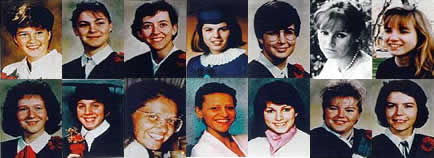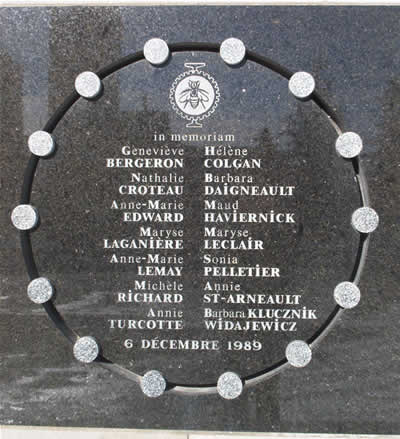
The fatal victims of the Montréal Massacre of December 6, 1989. Top row, left to right: Anne-Marie Edward, Anne-Marie Lemay, Annie St.-Arneault, Annie Turcotte, Barbara Daigneault, Barbara Maria Klucznik, Geneviève BergeronBottom row: Hélène Colgan, Maryse Leclaire, Maryse Laganière, Maud Haviernick, Michèle Richard, Nathalie Croteau, Sonia Pelletier20 years ago, I was a student at Queen’s University in Kingston, Ontario. I was also a volunteer at the university women’s centre.
I say “volunteer”, but truthfully, there wasn’t much to do there, even if there was a lot of will to do things on the part of that one little clutch of women. The late 1980s were something of a black hole for feminism. A lot of people thought that the main goals of the movement had been achieved, and that what was left of the movement had to be nothing but a bunch of radical, man-hating lesbians who didn’t shave their legs.
We knew it wasn’t like that. We had
some lesbians, yes–and
some radicals, yes. But we weren’t all lesbians, or even all that radical. And man-haters? Definitely not. I’m straight, and my best friend is a gay man; my radicalism was then a work in progress (still is). For the most part, we were just women, trying to raise awareness of the issues and to gain full justice for our gender. Leg-shaving wasn’t even an issue with us. There was too much else going on, most of it flying completely under most people’s radar.
Access to safe legal abortions was and still is under fire from the far-right here in Canada. AIDS, too, was fast becoming an issue for heterosexual women; today, they are the fastest-growing group of HIV-infected persons. And domestic violence hadn’t exactly gone away, either. Date rape, usually involving alcohol and/or drugs, was a growing problem, particularly on university campuses (it’s even worse now.) And working women had yet to earn more than 65 cents to a man’s dollar (they still haven’t come anywhere near 65 cents today, either). Male students on our campus mocked an anti-date-rape campaign with window signs reading “NO MEANS MORE BEER”, “NO MEANS SHE’S A DYKE”, “NO MEANS KICK HER IN THE TEETH”, and other equally charming sentiments. These were the things we concerned ourselves with, back in the dying days of the smug, complacent 1980s.
But that smugness and complacency were all-enveloping, even stifling. Apathy was about the only thing that ran rampant on our campus, other than hordes of drunken, purple-dyed engineers during Frosh Week. For that reason, we felt isolated. (Isolation is an oppression unto itself.) There wasn’t much to do at the centre, other than log the occasional incoming phone call, or help a rare visitor check out a book from the centre’s tiny library. Most of my time there I spent reading those books myself, contributing to my informal education with an undeclared minor in women’s studies. Often I found myself wondering when and if I would ever get to put this newfound knowledge to use. More often, it felt like just a small group of women, maybe a dozen in all, that got together to socialize now and then, and talk politics rather than family over the dinner table.
I remember one potluck dinner we had, when I drank too many glasses of wine and walked euphorically home in minus-20 weather without my hat and gloves, and with my coat undone, thinking what fun it had been, what amazing women they all were, and how great and strange it was that I couldn’t feel the cold. I walked alone, not the least bit scared–it’s easy to take back the night when the streets are deserted anyway! Later, when I got into bed, I had something worse than the bed-spins: I found myself unable to breathe in the warm, stuffy room. I kept myself awake that night with gruesome thoughts, reminding myself to breathe, and breathe, and breathe. Not so euphoric, after all.
But that night paled in comparison to something else that happened later on.
In the early morning hours of December 6, 1989, I had a particularly vivid and baffling dream. In it, I was with a group of women, and we were all wearing beautiful dresses in various bright colors, with beaded trim, and wreaths of silk flowers in our hair. We were dancing in circles around a silver fountain in some indoor atrium, to electronic pop music. Suddenly, the record stuck. Then came a rapid-fire banging noise, that at first sounded like part of the song’s beat, but wasn’t. It was gunshots. The women scattered in panic and hid. Then another song began to play–“The First Noel”. The women came out of hiding again, but this time, very solemnly, they gathered around the fountain in little clusters, with their arms around each other. I looked and saw that some of the women were wearing badges of a purple fabric with some indistinct crest embroidered on it in gold and silver thread, and was told that this was the symbol of feminist mourning.
Then I woke up.
I wrote the dream down in my diary, then promptly forgot about it and just went on with my day as usual: breakfast, classes, lunch, more classes, supper. By that time I was so caught up in my end-of-semester essays (ah, the joys of being an English major!) that I had completely forgotten my dream. I settled down on the couch to read a bit and scratch out some notes before heading to my typewriter.
Then the phone rang. It was Bridget, a fellow volunteer at the Women’s Centre. She told me something that ran through me like a lightning bolt: A gunman had opened fire at a Montréal university, and fourteen people were dead. All were women. Apparently the man had separated the people in the room by gender before opening fire, claiming he was at war against feminists. Those were his words, in French.
Je lutte contre les feministes!I walked to my bedroom in a daze. I lit the candle on the little goddess-altar I had built on my dresser, then sank to the floor in shock. Fourteen women dead–for being “feminists”!
And it had happened at a university.
I was in university.It could have happened anywhere.
It could have happened here.It could have been any woman.
It could have been me.I walked around in limbo for several days after that. I don’t remember much of what I did then, only that I attended a vigil in one of the big lecture halls. There was a space down in front that was women-only, and I sat there. It wasn’t some radical separatist thing; it was a need for the comfort of my own, my sisters. Someone tied a scrap of purple fabric–sweatsuit fleece, by the looks of it–around the sleeve of my coat.
The badge of feminist mourning. The woman next to me was young and pretty, a student too. I knew her only vaguely as the friend of a friend; her name, I think, was Robin. She was rather short and plump, with honey-colored hair and a friendly, roundish face; she wore glasses. She took my hand, and then she said something surprising, innocent and utterly heartbreaking all at once:
Your hands are so small!I began to cry. And I thought, irrationally but still relevantly:
Yes, my hands are so small–and that’s just the problem, isn’t it?A muted soprano chorus rose up from the crowd:
We are sad and grieving women, and we are singing, singing for our lives… I joined the singing.
She held my hand throughout the service, and in the end it was strange, if small, comfort. A comfort to know that I wasn’t so alone in the struggle now, that even the most complacent had been shocked awake, but a sad, cold comfort too, because fourteen women had to die in order to prove that we feminists were right–there was still so much to do!
And yes, there still is. Twenty years later,
it’s an ugly thought that
we still have so much fighting left to do. Tiring, depressing–haven’t we been through all this shit? Why aren’t we done with it yet? Why so much more, still,
now? The Spanish word for struggle is
lucha. More accurately,
la lucha. It’s feminine. In some parts of Latin America, Lucha is even a woman’s name. Struggle, in other words, is a woman.
Es larga, la lucha. The struggle is long.
This, then, is our struggle, and that of all women:
Fourteen women died just because they were women, at the hands of a violent loser who was pissed because he couldn’t make it into engineering school, 20 years ago. He wasn’t smart enough, but he blamed women for his own failure. We hold memorial services, very lovely ones too, but do we really remember what it’s all about?
Or do we do this to silence what we really ought to remember?Not enough has changed since then, and what has changed, is constantly under fire–literally–from the forces of conservatism. There is now talk of scrapping the
long-gun registry, which women fought for in the wake of the Montréal Massacre. Never mind that police chiefs like it, and even
a lot of gun owners understand that it’s no worse than a motor-vehicle registry. No, the conservatives
think it’s too much of a bother to keep it, just as it’s
too much of a bother to keep the Status of Women committee properly funded (and run by someone other than cock-sucking toadies). The conservatives are always out to fuck us over, and who gets it in the neck first? Yep–women. Same as it ever was…
Conservatism is a luxury, affordable only for the complacent, the apathetic, the ignorant. The ones who are doing all right, because they’ve got theirs, jack. It’s telling that men go that way a lot more than women as they get older. That’s because they can afford to. They
still make 40 cents more on the dollar than we do! It might as well be 1959, from where we women sit. At least, back then, a dollar–or a woman’s 60 cents–went further. Thanks so much for the phony liberation, capitalists! You can keep your fucking Virginia Slims, this “baby” hasn’t come a long way at all.
Yoko Ono was right; we
are the niggers of the world. Black, brown, yellow, white–whatever our color, we women are the underclass in every class we occupy. We’ve gone from slavery to sharecropping, and even now, we’re still stuck in the ghetto, making less than a man but paying more. Can anyone honestly say we are not
worth 3/5 of a man when they remember that we’re just making 61 cents to a man’s dollar after all this time? That’s negritude for ya, baby.
We got the vote, but do we get what we vote for? And when we get it, do we get to keep it? And can you believe that here in Canada, we were
not even considered persons until 1929? And that after all this time, there are still a shitload of crabby old coots–conservatives, in other words–who think that what little we get is entirely too much for us?
When a man gets beaten up, chances are that it’s by another man, and that there is nothing sexual or gender-based in the violence. Women? Well, let’s put it this way–it’s rarely another woman who beats
them up. Just as it’s rarely a woman who beats up a man. The bulk of violence women face is distinctly gender-based, and it is directed against them,
just because they are women. Worse, our culture glorifies it even more now than it did back then. In fact, a lot of people–some of them women!–will even say we had it coming, because we supposedly got too damn uppity for our own good. If only we’d stayed home, baking cookies and popping babies out of the oven like we women are supposed to (according to the female misogynist group called
R.E.A.L. Women), none of this would happen…
Except it
does happen to women who stay home. In fact, those are the worst-abused ones of all. Their submission grants them no protection from the violence, the misogyny and often, the alcoholism of their men. This kind of “traditional” family plays hell on the children. Just ask
Patrick Stewart. Yes, TV’s super-rational Captain Picard is the son of a battered housewife and an alcoholic father! Who knew?
Oh, only the world’s long-suffering millions of women. We know all about that. But who listens to us? Whenever we say something about it, even if we’re polite and apologetic and not offensive in the least, we get beaten down with derisive cries of “man-hating lesbian bitch”. Even our own sisters shout us down!
Well, fuck that shit.
Nothing will ever get done about anything if no one raises hell. So why not us women? After all, we live in it every day. I’m getting more radical, not less, with age–and I don’t care how many wimps and losers I scare off with it. The revolution,
la revolución, oh look, another woman–is not for wusses. My hands may be small, but they’re full of rocks, and I can hurl them a lot better now. I’ve had lots of time in which to do it.
Es larga, la lucha. The struggle is long. But I’m just getting started.
It’s been twenty years now, and my tears are still not dry.







Hear hear.
Bina, what a beautiful and moving post. I’m actually tearing up about it. This happened when I was in grade 9. I was from Montreal. I remember my father who was an engineer coming back form a Christmas party at the office a bit drunk, but also crying about the whole situation. I never saw him cry like that. Ever since, I have been strongly feminist and was lucky to grow up in a household where that was a given, a fact of life, and the most important symbol of human progress this past century.
I would just add that conservativism has degenerated from ignorant and apathetic to the selfish, brutish, and deliberately malevolent.
Thanks also for the Patrick Stewart story. I’ll post to facebook!
Paranoid gun nuts in the United States, in a bizarre effort to deny themselves healthcare, are claiming the Senate Health Reform Bill will lead to higher premiums for gun owners.
It’s a lie, but they deserve to pay much higher premiums for some desperately needed psychotherapy.
You made me cry, with this.
Thanks, everyone. Sorry I didn’t find your responses till today–apparently my spam filter was doing its job only too well!